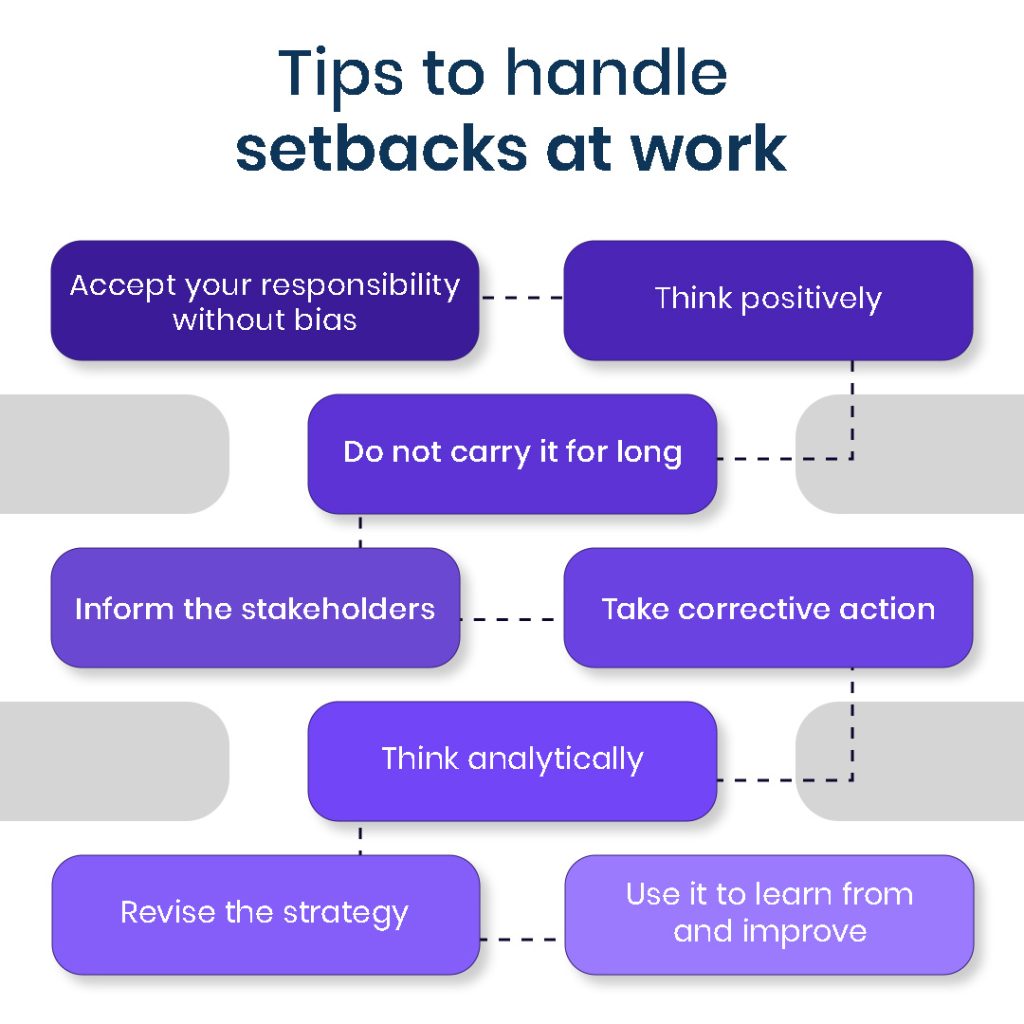
Failures happen to all of us, but it’s how we handle them that defines who we are.

Whether it was a missed deadline or a terrible presentation, we’ve all encountered failure at work at some point. It’s important to remember, though, that failure happens to everyone. If you can admit that you failed and take responsibility for your mistakes, you can learn from what went wrong and emerge stronger.
Most people I know have failed at work at some point or other. But failure doesn’t mean you’re not worthy. It doesn’t mean you will never succeed.
No matter how good you are, there is always the possibility that things may not go exactly as planned, even though you put in your best efforts. Today’s work environment is too fast-paced, making mistakes unavoidable. There are times when things don’t go the way we had planned, and we tend to feel like we have failed.
One of the most important parts of success is learning how to deal with disappointments. When something goes wrong, it’s important to take a few moments to think about what you could have done differently. If you’re feeling frustrated, it’s important to ask for a second opinion.
Failure is inevitable and success is never final. Even when a person has succeeded for years, certain strategies may fail from time to time. But, as I learned from my experience, there are effective ways to handle failure at work and learn from the experiences.
How to overcome failure at work?
Unexpected downturns or failed projects are not uncommon at work. However, you should not let the disappointment hold you back. You need to get back on track and refocus on the positive elements of the project.
Here are some tips to handle setbacks whenever it happens at work:

- Accept your responsibility without bias – It’s only human to make excuses for ourselves when we have problems. We hide serious problems, give excuses as to why they cannot be handled, or accuse others. Unfortunately, this is not going to help you learn and correct your weaknesses. You should have the maturity to accept your responsibility in any setback. By accepting responsibility, you demonstrate a willingness to learn. You might have been affected by several external factors that led to your failure. It is important, however, to also take other measures and turn the situation around. Can you, for example, participate in new training programs? Should you try harder?
- Think positively – Some people are extremely disappointed when they fail. One way to deal with a project failure that is annoying you is to focus on the positive factors that you have identified. Maybe you have gained new knowledge, therefore improving your skill set. Remember, it was not you who failed, but the plan or project. The moment you separate your self-esteem from the situation, it becomes much easier to get over it.
- Do not carry it for long – Don’t carry your failure for too long. Despite the difficulty of forgetting past errors in the project, we must accept that they can’t be changed and that we only have the ability to make improvements in the future. The first thing you need to do is stop brooding. Walk away from the project for a few hours or a day. You may be angry, frustrated, and disappointed, but these feelings are not the enemy; they are simply a signal that something has gone wrong. Once you have recognized your feelings, try to turn your focus to something else.
- Inform the stakeholders – You have to take the necessary steps to prevent any damage to the business of the stakeholders. They should be informed beforehand so that they won’t be affected. Make sure there is a fallback plan for ensuring the continuation of stakeholders’ businesses.
- Take corrective action – It is essential to get back on track as soon as possible. You need to help the team recover and find an immediate solution. The focus should be on preventing further harm. Also, devise methods to avoid a future occurrence of the same problem.
- Think analytically – Looking at a failed situation analytically will help you examine the situation and learn from it. You can apply this knowledge to your next project. By keeping emotion and logic separate, you can rationally work out a solution.
- Revise the strategy – The business strategy should be revised and adjusted. To be successful you have to learn to embrace change and become innovative. Changing the strategy will help to take calculated risks in the future, analyze the reasons for failure, and use the knowledge to perform better.
- Use it to learn from and improve – Don’t consider failure as final. You must think of it as a way of life that teaches you valuable lessons to improve yourself. Think about what you can do to get the best results. In order to achieve future success, you must learn from your mistakes and turn them into powerful experiences. No one can be perfect. Do not let your fear of failure override your capabilities. Take advantage of what you learned from the failure by putting into practice the things you learned this time.
Wrapping it up
If you want to be successful, you’ll need to learn to bounce back from failure. We all experience setbacks in life, but the ones who have the best chance of coming out ahead are those who can learn from their mistakes. The key is to not let your failures stop you from reaching your goals.
In the history of mankind, there have been many instances when people had great potential and talent but failed miserably before attaining success. Abraham Lincoln, Bill Gates, and Steve Jobs are inspiring examples of persistent individuals who have turned failure into success through their hard work and persistence.
Honestly speaking, if there are no setbacks, you have not tried hard enough or taken enough risks. Failures at work are a part of your learning process and the stepping stones to success.
Follow me on LinkedIn
FAQ
What are common failures?
The common types of failures are complexity-related failures, preventable failures, and innovative failures.
What causes failure at work?
Failure at work is often caused by bad planning, negligence, lack of persistence, and ill discipline.
How do failures lead to success?
Failures are learning opportunities to identify the pitfalls and implement corrective measures that can lead to success.
How can we avoid failure?
Failures are quite natural and cannot be avoided completely. However one can overcome the fear of failure by learning to accept failures as a part of growth.



